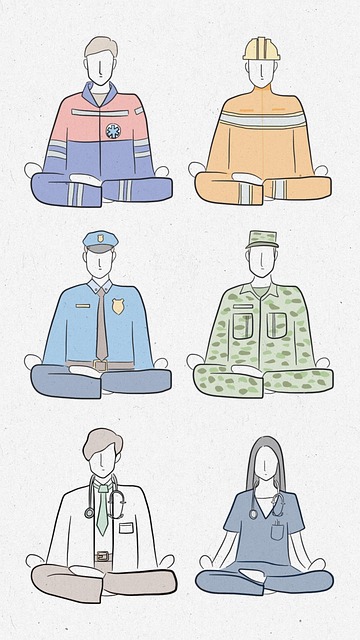Crisis intervention in child therapy is a specialized approach designed to support children experiencing acute emotional distress or trauma, particularly those exposed to domestic violence. Skilled therapists use cultural sensitivity and coping techniques to help young individuals manage intense emotions, restoring their sense of safety and control. This strategy addresses immediate crises and fosters resilience, laying the groundwork for long-term mental health recovery. Early identification of behavioral changes in children exposed to domestic violence, through programs like Social Skills Training and Mental Health Education, is crucial. Proactive safety planning, immediate response strategies, public awareness campaigns, and conflict resolution techniques empower victims and promote healing. Short-term support and stabilization techniques provide immediate well-being, while integrating Mental Health Education Programs strengthens family resilience. Advocacy for robust mental health policies ensures effective systems responses to domestic violence crises, improving access to therapy for affected children.
“In the delicate field of child therapy, crisis intervention strategies are vital tools for safeguarding and supporting young minds facing domestic violence. This comprehensive guide delves into essential aspects of identifying and responding to such crises effectively. From understanding the intricacies of crisis intervention in child therapy to recognizing subtle signs of domestic violence, this article equips professionals with practical knowledge.
Explore evidence-based techniques for immediate response, short-term stabilization, and referral options for long-term care, ensuring every child receives the support they need to overcome adversity.”
- Understanding Crisis Intervention in Child Therapy
- Identifying Signs of Domestic Violence in Children
- Safety Planning and Immediate Response Strategies
- Short-term Support and Stabilization Techniques
- Referral and Long-term Care Options for Survivors
Understanding Crisis Intervention in Child Therapy

Crisis intervention in child therapy is a specialized approach designed to provide immediate and intensive support for children facing acute emotional distress or traumatic events. In the context of therapy for children exposed to domestic violence, understanding crisis intervention becomes even more critical. This strategy focuses on helping young individuals cope with intense feelings, such as fear, anger, or grief, and providing them with essential tools to regain a sense of safety and control.
Therapists skilled in this area offer trauma support services tailored to the unique needs of children. They incorporate cultural sensitivity in mental healthcare practice, recognizing that a child’s background and experiences shape their responses during crisis moments. By promoting emotional well-being through various techniques, therapists help children develop resilience and effective coping mechanisms. These strategies not only address the immediate crisis but also lay the foundation for long-term mental health and recovery.
Identifying Signs of Domestic Violence in Children

Children exposed to domestic violence may exhibit various signs that could indicate their experiences. These signs often manifest in behavioral and emotional changes. For instance, a child from a violent home might become more aggressive or withdrawn, showing sudden mood swings and irritability. They may struggle with concentration and perform poorly at school, sometimes even displaying a lack of empathy towards others. These children often need therapy for domestic violence to help them process their emotions and develop healthy coping mechanisms.
Identifying these signs is crucial for fostering Mental Health Awareness. Social Skills Training and Mental Health Education Programs Design can play a significant role in supporting these children. By recognizing the warning signals, educators and caregivers can intervene early, providing the necessary support and resources to help children heal and grow.
Safety Planning and Immediate Response Strategies

In situations of domestic violence, safety planning and immediate response strategies are crucial for ensuring the well-being of children. Safety planning involves creating a step-by-step guide tailored to each family’s unique circumstances, focusing on how to respond during or after an incident. This can include establishing safe spaces, developing communication protocols with trusted individuals, and identifying local resources like domestic violence shelters and therapy services for children. By implementing these strategies, families can enhance their ability to navigate crises more effectively.
Immediate response strategies are designed to manage the acute stress and trauma that arise from exposure to domestic violence. These techniques emphasize quick, practical actions such as ensuring physical safety, providing emotional support through empathy-building strategies, and offering reassurance. Public awareness campaigns play a vital role in educating communities about these immediate response strategies, fostering an environment where victims feel supported and encouraged to seek help. Additionally, conflict resolution techniques can be integrated into therapy for children, helping them develop healthy coping mechanisms and enhance their ability to resolve conflicts peacefully.
Short-term Support and Stabilization Techniques

In situations of crisis, especially when children are affected by domestic violence, short-term support and stabilization techniques play a pivotal role in their immediate well-being. These strategies, often employed by mental health professionals, focus on providing immediate relief and ensuring safety. Techniques may include trauma-focused therapy, designed to help children process and express their experiences, fostering emotional regulation skills crucial for coping with stress. Mental Health Education Programs can also be integrated into this phase, teaching both children and caregivers coping mechanisms and enhancing family resilience.
Stabilization might involve creating a safe, supportive environment, establishing routines, and providing concrete resources. These measures serve as a bridge to longer-term therapy, offering a sense of security and normalcy. Additionally, advocates emphasize the importance of Mental Health Policy Analysis and Advocacy in ensuring that systems respond effectively during crises, addressing underlying issues that contribute to domestic violence and improving access to appropriate therapy for children affected by such traumatic events.
Referral and Long-term Care Options for Survivors

After a crisis or traumatic event, survivors often require specialized care and support to navigate their emotional healing processes. One crucial aspect of crisis intervention is providing appropriate referral and long-term care options tailored to the unique needs of each individual, especially in cases of domestic violence where children are involved. Therapy for children exposed to domestic violence plays a pivotal role in fostering their emotional well-being and resilience.
Professionals should guide survivors towards accessible resources such as therapy services specializing in trauma-focused care, counseling centers offering group support sessions, and community outreach programs that promote self-care practices. These interventions aim to empower survivors with mind over matter principles, helping them regain control and rebuild their lives. By ensuring continuity of care, from immediate crisis intervention to long-term emotional healing, survivors can access the necessary tools for a successful recovery.
Crisis intervention plays a vital role in supporting children affected by domestic violence. By understanding the signs, implementing safety planning, and utilizing short-term stabilization techniques, therapists can foster resilience and promote healing. Referral to specialized services ensures long-term care and recovery for survivors, offering them a path towards a safer and more secure future. This comprehensive guidance equips professionals with the tools to navigate these complex situations effectively, ultimately enhancing therapy for children experiencing domestic violence.














